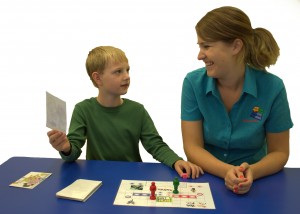 Did you know that language and communication delays and disorders are among the most common difficulties facing school aged children? Estimates place the rate at between 13% and 20% of school aged children and these difficulties affect learning, literacy, social skills and self esteem.
Did you know that language and communication delays and disorders are among the most common difficulties facing school aged children? Estimates place the rate at between 13% and 20% of school aged children and these difficulties affect learning, literacy, social skills and self esteem.
This is around 10 times more common than autism and yet many people, including parents and those who work with children are less aware of these disorders. The rate is about the same as childhood obesity which attracts large amounts of funding for public programs to support children, yet support for school aged children with communication and language difficulties is hard for many to access.
A committee of the Australia senate in September 2014 released a paper titled "Prevalence of different types of speech, language and communication disorders and speech pathology services in Australia". This stated "The prevalence of speech and language impairment in school aged children is significant, with studies revealing that 13% of children at primary & secondary schools in Australia have communication impairment. Other studies put this figure at a higher level" .."Australian teachers report that 21% of school students have an expressive language difficulty upon entering schooling."
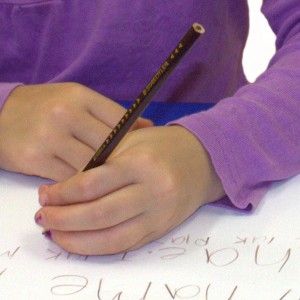 The paper also looked at the effects of these difficulties on children and reported " At the public hearing in Melbourne, Professor Reilly gave evidence that adults (aged 34 years) who had a language impairment at the age of five have up to seven times higher odds of poor reading, five times higher odds of mental health difficulties and three times higher odds of unemployment."
The paper also looked at the effects of these difficulties on children and reported " At the public hearing in Melbourne, Professor Reilly gave evidence that adults (aged 34 years) who had a language impairment at the age of five have up to seven times higher odds of poor reading, five times higher odds of mental health difficulties and three times higher odds of unemployment."
The paper also talked about the importance of communication. "Communication skills are essential in all aspects of life including health and well-being, education and training, family and social relationships, recreation, and work. It has been documented that difficulties in communication skills may have major implications for school success, self-esteem, independence, teacher-student relations, peer relations, literacy and numeracy development, behaviour and problem solving, occupation, economic self-sufficiency and costs to society." You can download a copy of the report here.
So what causes language difficulties in children? Children’s development of language depends on many things both within and outside of the child. It is affected by health issues such as hearing, prematurity, general well-being, disabilities and family history of language difficulties. The child’s experiences at home, child care and school also affect how their language develops. When a child has difficulties developing language there are often a number of things involved. There are also many things that can be done to help the child develop better language skills and things that can support their learning and social development to reduce the long term impact of their difficulties.
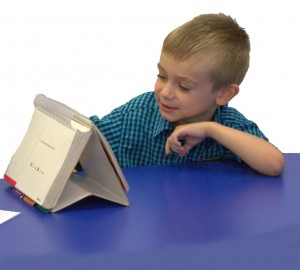 Language difficulties can be divided into two broad areas though many children have difficulties with both areas.
Language difficulties can be divided into two broad areas though many children have difficulties with both areas.
Receptive language refers to the child’s ability to understand the language that others use. This includes understanding words and sentences in order to learn new things, following instructions, answering questions and later on to understanding and remembering things that are read. Children with receptive language difficulties may have difficulties in some or all of these areas.
Expressive language refers to the child’s ability to express needs and ideas to others. Children who have difficulty using words or formulating sentences can find it hard to communicate with others and may become frustrated or withdrawn. At school they will also have difficulty expressing themselves in writing.
The number and complexity of words and concepts a child understands and uses in their speech has a major impact on their learning. Children also need to learn how to use language in a social setting, such as when holding a conversation. Children take time to develop these skills also and while most develop these skills through social contact others need specific help and teaching to develop these skills.
Some signs a child may be having difficulties with language skills include:
- Not showing the same level of communication, social and literacy skills as others of the same age.
- Difficulties with following instructions or answering questions.
- Difficulty explaining things or retelling experiences.
- Difficulties forming sentences, or spelling when writing.
- Difficulties relating to peers, making and keeping friendships.
- Not progressing with learning, reading or understanding what they read.
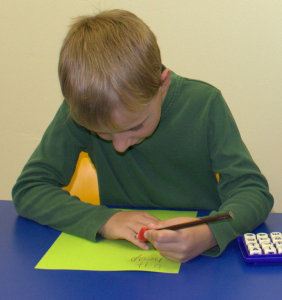 What can be done to help? A language assessment with a speech pathologist is a good place to start as each child's challenges and needs are different. A language assessment covers a range of skills in both receptive and expressive language as well as related areas such as speech and literacy when needed.
What can be done to help? A language assessment with a speech pathologist is a good place to start as each child's challenges and needs are different. A language assessment covers a range of skills in both receptive and expressive language as well as related areas such as speech and literacy when needed.
Assessment may include:
- the meaning aspects of language such as understanding words and concepts,
- the way words are put together to form sentences,
- use of grammar,
- forming longer pieces of language such as stories,
- how language is used such as in holding a conversation and solving problems,
- speech production or way the child uses sounds to form spoken words,
- written language skills including forming written words, sentences and stories,
- phonological awareness such as understanding sounds, syllables and rhyme, hearing sounds, using letters, breaking down words into separate sounds and blending sounds together to form words
This information allows the speech pathologist to pinpoint the child’s strengths and weaknesses. At the end of the assessment the results are discussed with the parents and where appropriate teachers. The parents and other relevant people are then provided with a written summary of the assessment outcomes and activities and strategies to assist the child. A range of support options such as individual therapy and/or group programs may then be offered.
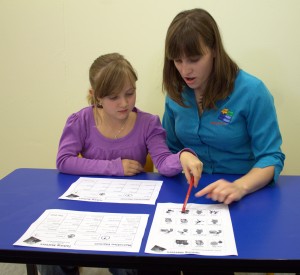
In addition to individual therapy to improve the child's skills, there are lots of strategies that can be helpful in the classroom to help develop language and literacy skills and minimize the impact of the child's difficulties on their learning. Some things that may be helpful include:
1. Using visuals. Children with language disorder learn better by seeing than hearing so use things your child can see as much as possible, such as:
- Maps, diagrams, pictures or video.
- A list of important words.
- A plan or schedule of the steps for a task or an outline of a project.
- Use of planners and mind maps.
- Hands-on activities and showing as well as telling what to do.
2. Supporting comprehension by:
- Breaking down information into smaller chunks.
- Using simpler vocabulary and avoiding jargon
- Being aware of words with multiple meanings.
- Checking a child's understanding at each step of a task.
- Teaching key new words and concepts before starting new topics.
- Proving written notes for the student to follow as you speak.
- Marking important words and concepts with a highlighter.
- Making lists of important words and teaching their meanings.
- Linking new information to known information.
- Allowing extra time to learn new information or concepts.
3. Supporting children in producing written work by:
- Making a plan of work before starting.
- Talking through information before writing it down.
- Following the steps of brainstorming, planning, writing then checking work.
- Trying other ways of presenting work of such as talks, models, posters, PowerPoint presentations, videos or tape recordings.
4. Helping children use correct sentences and grammar by:
- Encouraging them to read their own work out loud. This often makes grammatical errors easier to notice.
- Encouraging them to do a rough copy then check their work, or read to another person and ask them to help check it.
- Using a word processor with spelling and grammar checks.
5. Helping children to be independent by:
- Checking their own work for spelling and grammar as well as meaning before asking for help.
- Teaching use of a dictionary to check new words, spelling and grammar checkers and a thesaurus to find new words.
- Requesting help when needed or using a buddy.
Our posts for March will look more at what can be done to help school aged children develop language skills, so why not join our followers?
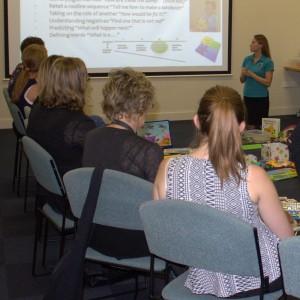 Want to find out more? Talking Matters is presenting a workshop on "developing oral and literate language in school aged children" on March 18 in Adelaide from 4.30 to 6.30. Click here to find out what other workshops we also have planned. We also have lots of information on our website, Facebook page, Twitter, and Pinterest.
Want to find out more? Talking Matters is presenting a workshop on "developing oral and literate language in school aged children" on March 18 in Adelaide from 4.30 to 6.30. Click here to find out what other workshops we also have planned. We also have lots of information on our website, Facebook page, Twitter, and Pinterest.
Looking for support for your child? If you have concerns about your child's speech or language skills the Talking Matters website has information about these skills. We provide individualised assessments and therapy for children with speech, language and learning difficulties and other disabilities. Our aim is to help parents help their child reach their potential. This information is not designed to replace professional support where this is needed rather it can be used in conjunction with professional therapy to support children's skill development.
To find out more about how the Talking Matters team can help your child click here. We provide speech pathology, occupational therapy and psychology services to children with a range of needs including language difficulties and autism spectrum disorders.
If you live in Adelaide and would like to discuss how Talking Matters can help your child call our friendly office staff on 08 (08) 8255 7137.
Jo Brenecki
Speech pathologist
Related Blog Posts
If you liked this post you may also like:
Playdough Faces
Why books for christmas
Packing the School Bag - Supporting Your Child's Development
Games for the car



